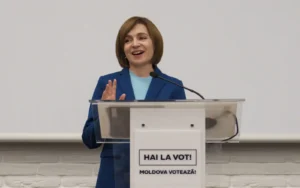Dorin Recean in Parliament (source: Flickr)
On September 28, parliamentary elections take place in Moldova. Snap elections were called amid political deadlock, following the collapse of the pro-Western government of Prime Minister Dorin Recean. There are 3,299,396 registered voters for the upcoming elections according to the Central Electoral Commission (CEC). The last national election was the 2024 presidential election, which saw a 54% turnout, while the previous parliamentary elections in July 2021 gave the Party of Action and Solidarity (PAS) 63 out of 101 seats, enabling a rare single-party majority government.
Voting will again take place not only inside Moldova but also abroad, reflecting the importance of the country’s large diaspora. For these elections the CEC printed more than 864,000 ballots for overseas polling stations, while another 2,472 ballots were distributed for postal voting in ten countries. In total, 301 overseas polling stations will operate worldwide, making diaspora participation potentially decisive. Pre-registration is not required for in-person voting, but the number of ballots sets the upper limit of turnout abroad.
Main Parties and Leaders
The election pits Moldova’s ruling Party of Action and Solidarity (PAS) against several new or reconfigured challengers. PAS, led by parliamentary speaker Igor Grosu, is pro-European, liberal-centrist, and affiliated with the European People’s Party. Since 2021 it has framed its agenda around EU integration and anti-corruption reform. Maia Sandu, the current president of Moldova, is the founder of PAS.
The main rival bloc on the left is the Patriotic Electoral Bloc (BEP), formed in summer 2025 as a coalition of the Socialist Party (PSRM), the Communists (PCRM) and smaller allies, with former president Igor Dodon as its figurehead. The bloc advocates closer relations with Russia and a “balanced” foreign policy.
Another contender is Our Party (PN), led by Renato Usatîi, the populist former mayor of Bălți. PN presents itself as an anti-establishment force, drawing support through its criticism of political elites and its appeal to voters frustrated with corruption and poor living standards. While its program mixes populist and pragmatic elements, Usatîi has positioned the party as sceptical of both PAS and the pro-Russian left, making it a potential wildcard in coalition formations.
A further competitor is the Alternative Bloc (BEA), founded in January 2025 and spearheaded by Chișinău mayor Ion Ceban together with former officials Ion Chicu and Alexandr Stoianoglo. The bloc claims a pro-European stance but appeals to centrist and pragmatic voters, emphasizing governance and social stability. The European Social Democratic Party (PSDE), under Tudor Ulianovschi, represents a pro-EU centre-left current and is an associate member of the Party of European Socialists.
Polls and Prognosis
The race has tightened. Recent surveys diverge: some still put PAS in first place, but others show a virtual dead heat with the pro-Russian Patriotic Electoral Bloc (BEP), and even a wafer-thin BEP edge once only decided voters are counted. A large pool of undecided voters remains, while Our Party and the Alternative Bloc sit near the entry threshold; a detail that could swing seat allocations on election night. PSDE sits just under the threshold in most polling surverys, however this may change come election day.
Taken together, the polling picture points to a competitive contest in which PAS is no longer assured of governing alone. Whether it finishes narrowly ahead or neck-and-neck with BEP, the outcome is likely to hinge on how undecided voters break and which smaller forces clear the thresholds (5% for parties; 7% for blocs). Coalition bargaining therefore looks more probable than a repeat of the 2021 single-party majority.
Key Issues and What’s at Stake
The campaign is dominated by existential questions about Moldova’s place in Europe. PAS and its allies frame the election as a mandate for EU accession, targeting 2030 as the year of membership. Their opponents, especially on the left, counter with calls for neutrality or a “dual-vector” foreign policy that would maintain closer ties to Russia.
Economic anxieties loom large. Rising prices, energy insecurity, and the lingering shocks of Russia’s war in Ukraine have dented public confidence, providing fertile ground for populist and opposition forces. Justice reform and the fight against corruption, PAS’s signature theme, remain central but increasingly contested as critics accuse the ruling party of overreach.
Foreign interference has become a defining feature of this campaign, as it had during last year’s referendum. Moldovan authorities and independent monitors have pointed to Russian-linked financing networks, vote-buying schemes, and waves of disinformation, including AI-driven content. Several criminal cases and arrests underscore the seriousness of the challenge. For many voters, the election has thus become not only a choice of parties but also a test of the country’s ability to withstand external pressure.
The Future Scenarios
Whatever the outcome, the political landscape after 28 September is likely to be fragmented. If PAS again wins a majority, it will form government alone, and continue function as it has now. Should it fall short, the most plausible option is a PAS-led coalition with the Alternative Bloc, united by their pro-EU stance. An opposition-led arrangement centred on the BEP is possible on paper and would severely impede EU integration. If PSDE is to pass the threshold it is unclear where they would stand in coalition negotiations.
Such scenarios highlight the risk of fragile coalitions and political instability if no clear majority emerges. Observers warn that prolonged deadlock could slow reforms and complicate Moldova’s EU accession bid.
Election integrity will be closely scrutinised. The OSCE/ODIHR has deployed a full Election Observation Mission, while domestic NGO Promo-LEX is fielding hundreds of observers across the country. The CEC has mounted information campaigns to counter misinformation, including around mail-in voting. These safeguards aim to bolster confidence in the process at a time when the integrity of the electoral system is itself part of the political contest.
Written by Elene Amiranashvili



